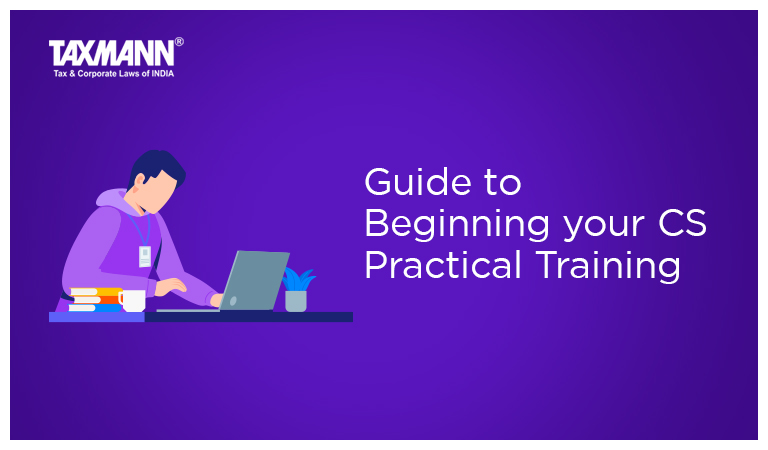Guide to Beginning your CS Practical Training
- Exam|CS|
- 3 Min Read
- By Taxmann
- |
- Last Updated on 23 December, 2023

Company Secretary (CS) is one of the much respected and in-demand professional qualifications in the country; aiding business entities in their various statutory and legal compliance management, financial management, due diligence, corporate restructuring, etc.
In order to complete the CS Course, besides successfully completing the necessary trainings, candidates are required to clear examinations conducted by the Institute of Company Secretaries of India (ICSI) in three stages –
-
- CSEET (Company Secretary Executive Entrance Test),
- Executive and
- Professional.
Further, CS aspirants have to undergo 21 months of Practical Training on whole time basis during normal working hours, which helps them to learn the underlying practical applications of the theoretical education scheme, thus maintaining a balanced approach of theoretical as well as practical knowledge.
This Practical Training ensures that the students have an opportunity to acquire on-the-job work experience of a professional nature.
But the question lies –
“When should a student begin his/her Practical Training in CS Course?”
This question is very important and decision has to be taken carefully by every CS Aspirant. It can decide how early a student can clear his/her exams and get the CS degree. CS training offers CS students an opportunity to grow, study, and gain professional expertise in order to become a future leader in the field. Students must be aware that organized training will assist them in gaining the necessary information and skills to execute the functions of Company Secretary. Working with an experienced Company Secretary having wide professional exposure is always beneficial for the students.
Before introduction of the New Training Structure 2020, it was beneficial to do training after CS Professional examination because a student would save not only time but also would be able to focus more on studies, which can be made evident as below:
| Particulars | Duration |
| After registration to CS Executive Programme | 3 years’ training required |
| After passing CS Executive Programme | 2 years’ training required |
| After passing CS Professional Exam | 1 year training required |
However, the duration of Practical Training under the New Training Structure as per Company Secretaries (Amendment) Regulations, 2020 is 21 months which can be done only after passing CS Executive. In such a case, a student has got two options i.e. either to join training immediately after clearing CS Executive or after completing CS Professional examination.
Let’s analyse the two situations with examples and see which decision would be better:
A candidate has passed CS Executive in February 2022, and would be eligible to appear for CS Professional exams from December 2022. He/She has two options:
1) Decide to join training immediately after clearing CS Executive and he/she would be able to complete the training by around February 2024. So the candidate can appear for CS Professional exams in December 2022, June 2023 or December 2023 attempts along with the ongoing training.
Candidate can even choose to appear for 3 modules in 3 attempts which would be easy to manage with the office. As per this assumption, candidate would become CS by February 2024.
Note: If a student is aiming for a rank in examination, then all the three modules must be appeared for together in the examination.
2) Decide to join training after completing CS Professional examination, i.e. appearing for CS Professional examination and clearing all the 3 modules by February 2023. Now the candidate joins the training, and will become CS Professional by February 2025.
With this analysis, we can conclude that situation 1 is beneficial as it will save a year for the student besides being able to manage exam pressure. Whereas in situation 2, if the candidate is unable to clear in 1st or 2nd attempt, there can be delay in his/her becoming the Company Secretary.
Disclaimer: The content/information published on the website is only for general information of the user and shall not be construed as legal advice. While the Taxmann has exercised reasonable efforts to ensure the veracity of information/content published, Taxmann shall be under no liability in any manner whatsoever for incorrect information, if any.

Taxmann Publications has a dedicated in-house Research & Editorial Team. This team consists of a team of Chartered Accountants, Company Secretaries, and Lawyers. This team works under the guidance and supervision of editor-in-chief Mr Rakesh Bhargava.
The Research and Editorial Team is responsible for developing reliable and accurate content for the readers. The team follows the six-sigma approach to achieve the benchmark of zero error in its publications and research platforms. The team ensures that the following publication guidelines are thoroughly followed while developing the content:
- The statutory material is obtained only from the authorized and reliable sources
- All the latest developments in the judicial and legislative fields are covered
- Prepare the analytical write-ups on current, controversial, and important issues to help the readers to understand the concept and its implications
- Every content published by Taxmann is complete, accurate and lucid
- All evidence-based statements are supported with proper reference to Section, Circular No., Notification No. or citations
- The golden rules of grammar, style and consistency are thoroughly followed
- Font and size that’s easy to read and remain consistent across all imprint and digital publications are applied



 CA | CS | CMA
CA | CS | CMA
